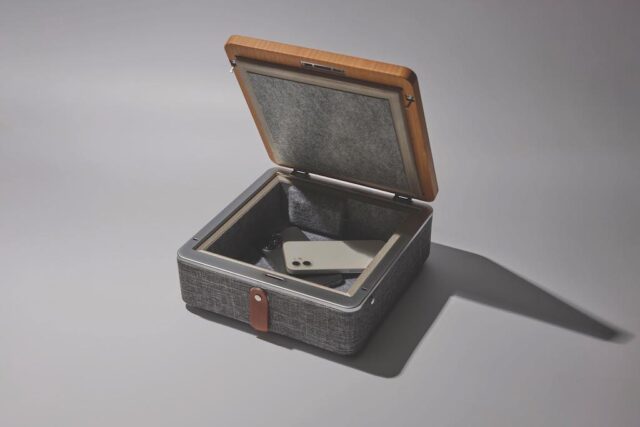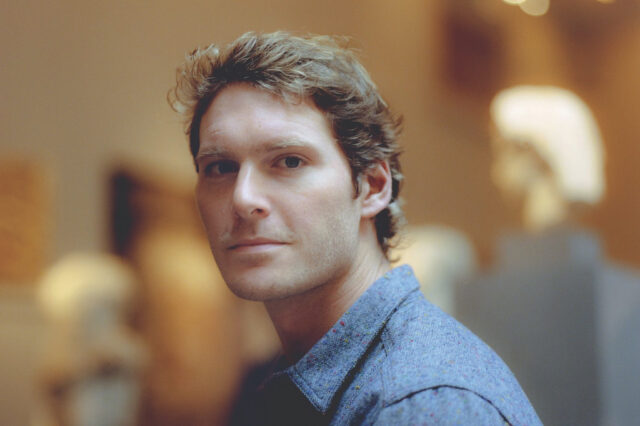
By Cristina Cuomo
CRISTINA CUOMO: What you’re doing is great. Your lockable pouches allow schools to become phone-free spaces, from arrival to dismissal. My kids’ school implemented it this year, and I was so relieved.
GRAHAM DUGONI: I’m happy to hear it. There are a lot of issues related to phones, and we tried to come up with a simple way to solve it.
CC: What does it mean to Yondr?
GD: If you go to a show that uses us, or you’re in a school and you’re a student being phone-free for the day, there’s an overriding sense of freedom and a sense of relief. Whether you’re a student or a person in the world for that time period, you can step into a safe space where what happens there, stays there, and you don’t have to worry about keeping up with social media or anything else.
CC: You studied the nature of anxiety and Kierkegaard and Heidegger. Tell me what you learned.
GD: I was in my mid-20s when I started the company, and I was looking at the way the world was and reading the people you mentioned. When I was looking at what was happening with people and some of the behavioral changes and the role of cellphones, I thought that there were going to be a lot of unforeseen consequences of people relying on these tools all the time. Most people have the sense deep down that life is moving very quickly, and everyone is running faster on the treadmill to stay in the same place. And as we do that, and everyone becomes busier, something is lost and there’s some kind of hollowing out of the meaning in life. I viewed it as my generation’s responsibility to create spaces where young people could experience walking through the world and not having their primary experience of the world be mediated through a screen or social media.
CC: You started in 2014, but I feel like it’s been catapulted into the school system and beyond as this must-have, phone-free-zone accessory. What was that radical change that took place in the past few years?
GD: I think the pandemic had a lot to do with it. Before then, as a company we were accelerating a lot and there was already a general awareness and understanding of what Yondr does and the need for phone-free spaces. I think the pandemic and parents watching what happens when their kids spend eight hours a day on their computer—whether it’s in remote learning or talking to friends—parents, but also just people, started becoming more attuned to the difference and what’s lost when you interact primarily through that medium.

CC: Is there some sense that one can do things more efficiently by taking a pause from technology?
GD: One hundred percent. We hear that a lot from parents whose children go to schools that use Yondr that once you develop that space where they’re not using their phone, it starts to migrate away from them and the compulsion is not there. The phone becomes tied up with their nervous system. When they’re on their computer so much and retrieving information online, that’s not exactly developing critical thinking. I think that’s a vital thing that needs to be wrestled with in education.
CC: Critical thinking is improving. Grades are going up. Discipline problems are becoming more abated. Defiance and disrespect is down. Students are interacting with one another. What other changes in schools have principals noted to you?
GD: The way students are interacting and their posture through the hallways. We hear a lot about the first day or the second day that Yondr is rolled out in school that a principal will walk into the lunchroom, and they’ll think a fight or something is happening because the lunchroom is so loud. Then, they’ll look and realize nothing bad is happening. It’s just back to the way it used to be with students talking and not isolated, sitting over in a corner scrolling on their feeds. We also hear a lot from teachers about just walking through the hallway and they see kids’ shoulders are back, their eyes are up, they’re making eye contact. The only thing that is time-tested is that in-person social interaction is the way that you build character and identity and the way you build community.
CC: Too much time on your device can create irritability and lack of connection and interaction in the real world, and you are completely—like the book says—unprepared for adulthood.
GD: A big part of growing up is taking risks. To take risks you have to have a primary interaction with people and things around you. The interesting aspect of technology and what Kierkegaard spoke to is that he wasn’t aware of digital media back then, but he understood the same concept that whether you’re texting, or it’s a phone call or social media, there’s always the option to opt out of the interaction and to stop and to participate when you want to, versus when you’re interacting with the real world around you there’s an inherent risk; whether you say something foolish or you do something stupid, you have to deal with the consequences and other peoples’ reactions in person. But that’s what builds character. It teaches you how to act in the world and how to grow.

CC: How do you think children becoming adults will look back on these years and their phone time? Do you think they’ll understand what their addiction was all about?
GD: I never really use the word addiction for it because everyone is probably on their phone too much. For young people, I’m not sure it’s the most inspiring message for adults to tell them that they’re sick and that we’ll make them better. I think a more inspiring message is to try to show them what the difference is between the digital world and real life and for them to choose as they get older what that means for them and to have a certain type of interaction with friends. It brings out a positive aspect of their personality and they feel the difference.
CC: I went to an Amy Schumer comedy show—the first time I experienced Yondr—and I handed over my phone. I thought, “Oh no, everything I have is in this phone. My credit card information. How am I going to pay for a bottle of water?” It made me realize the dependency that we have on these devices. In an effort to be more efficient, we’ve put all our eggs in one basket.
GD: I think about that a lot, and how all businesses are functioning with this as a foundational platform that you must have. It’s concerning; it’s all of our eggs in one basket. It’s a more dramatic decision than it needs to be to choose not to have a phone, or to walk around without your smartphone even for a period of time, but it’s doable and we’re seeing more and more young people choosing to do that. overyondr.com





